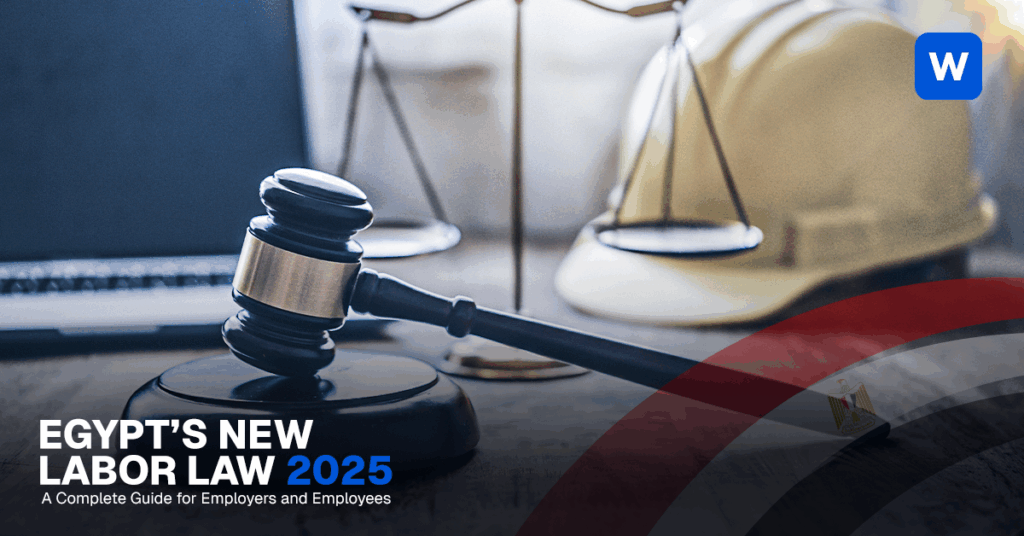Big changes are on the way for Egypt’s workforce. The New Egyptian Labor Law (No. 14 of 2025) will officially come into force this September, setting out fresh rules that will impact millions of employees and thousands of businesses across the country.
Let’s break down everything you need to know: when these changes kick in, who they’ll affect, what’s actually changing, and most importantly, what it all means for you, whether you’re an employer or employee.
When Will the New Egyptian Labor Law Take Effect?

The government has set the beginning of September 2025 as the date when the new Egyptian labor law becomes fully effective.
Companies have already been given time to adjust to the new requirements, but September marks the point when compliance will no longer be optional. Employers that haven’t updated their policies and contracts should use these final weeks to prepare.
Another important date to note is October 1, 2025, when Egypt’s new specialized labor courts will officially start operating. These courts will be responsible for handling labor disputes more efficiently and fairly.
Which Sectors Are Affected by the Changes in the New Labor Law?
The new Egyptian labor law casts a pretty wide net, but there are some important boundaries to understand:
- Who’s covered: All private sector workers are included – and this is great news for people in informal jobs, seasonal work, and other positions that didn’t have strong protections before.
- Who’s not covered: Public sector employees will stick with their current arrangements (with just a few exceptions), and this particular law won’t cover domestic workers. However, they’re getting their own specialized law designed just for their unique situations, and it should be coming soon.
What Changed in the New Labor Law? A Quick Summary
Egypt’s 2025 Labor Law introduces important updates that affect both how people work and how businesses manage their teams.
Some of the biggest changes include:
- Modern work models: Remote work, part-time roles, and gig jobs are now officially recognized.
- Employment contracts: Everything follows a standard format now, with crystal-clear rules about probation periods, contract renewals, and how long agreements last.
- Leave entitlements: Your leave options just got a major upgrade – annual vacation, sick days, maternity and paternity leave, plus other special circumstances are all expanded and protected.
- Working hours & overtime: More precise definitions of daily and weekly working time, set overtime compensation, and a guarantee of at least one paid weekly rest day.
- Wages: The private sector minimum wage is going up, and there’s now a requirement for annual salary bumps.
- Foreign workers: Tighter regulations on hiring, with caps on workforce percentages and mandatory permits.
- Retirement & end-of-service: Updated provisions on retirement age, with clearer rules for pensions and end-of-service benefits.
- Workplace safety & dignity: Stronger protections against harassment and updated health and safety rules.
- Termination & disputes: Stricter dismissal rules, clearer severance pay, and mandatory arbitration before labor courts.
- Notice periods: Longer notice periods now apply before termination, depending on length of service.
- Equal opportunities: Enhanced anti-discrimination protections and stronger child labor restrictions.
- Training and development: Employers now have more flexible rules to support upskilling their employees.
Want the full story on all these changes? Check out our comprehensive guide to Egypt’s New Labor Law for all the details.
What the Changes in Labor Law Mean for Employers and Employees in Egypt
This isn’t just another set of bureaucratic updates – we’re looking at a real transformation in how work happens in Egypt. Whether you’re signing the paychecks or receiving them, your daily work life is about to get better in tangible ways.
Employers need to get moving on this. HR teams should be reviewing their policies, updating contracts, and making sure payroll systems meet the new wage and leave rules. Trust us – the penalties for not following these changes aren’t something you want to deal with.
For workers, this is your chance to learn about and use your new rights. We’re talking clearer job contracts, better time off benefits, and stronger protection against unfair firing. The whole point is to make workplaces safer and fairer for everyone.
Conclusion
Egypt’s job market is set for major changes this September, with new laws bringing fairer rules and stronger protections for both employers and employees.
As companies adapt and workers look ahead, staying informed is essential. Whether you’re growing your career or building your team, WUZZUF is here to guide you through this new chapter with confidence.
Ready for your next Career Step?
Explore the best Jobs and Internships in Egypt and Saudi Arabia on WUZZUF Today!

